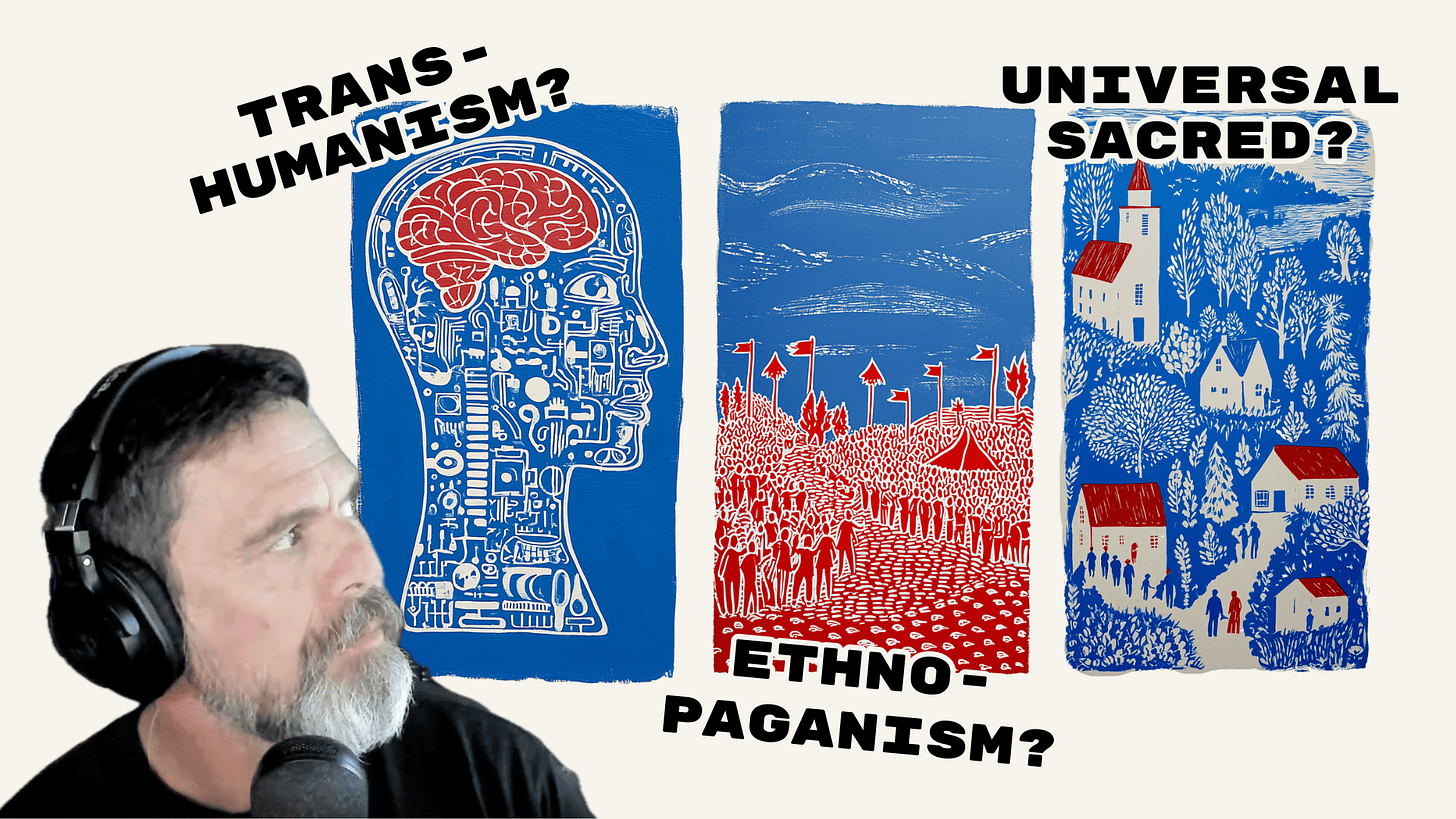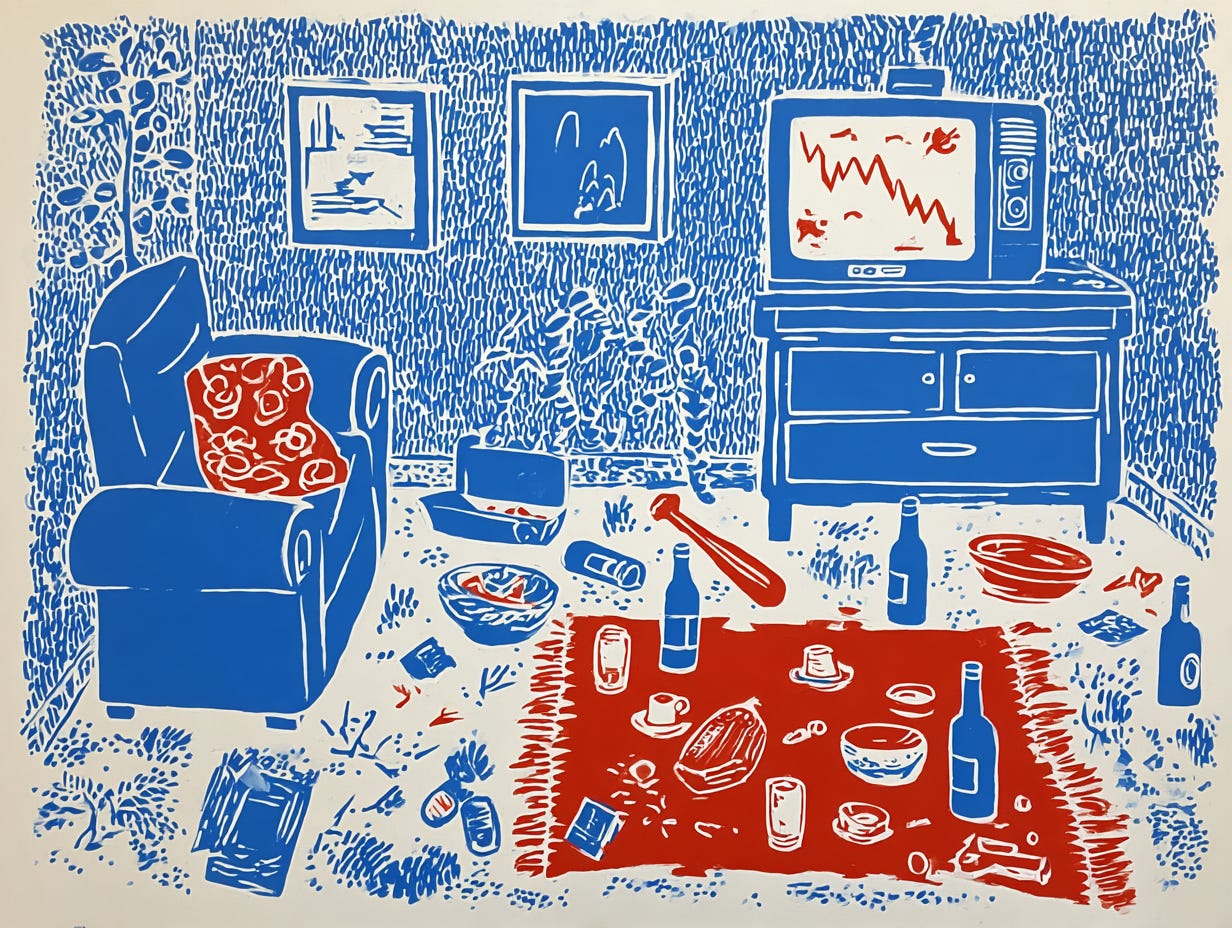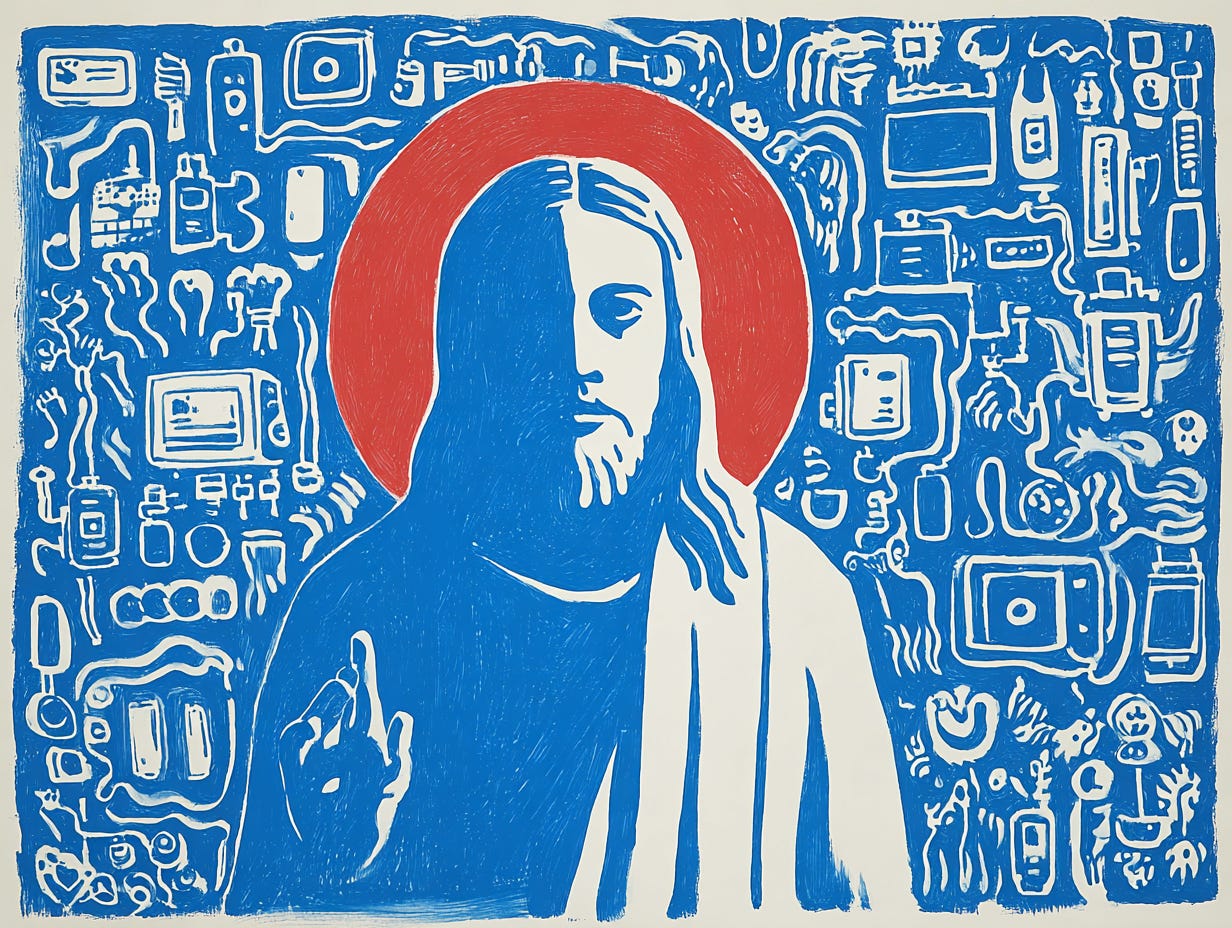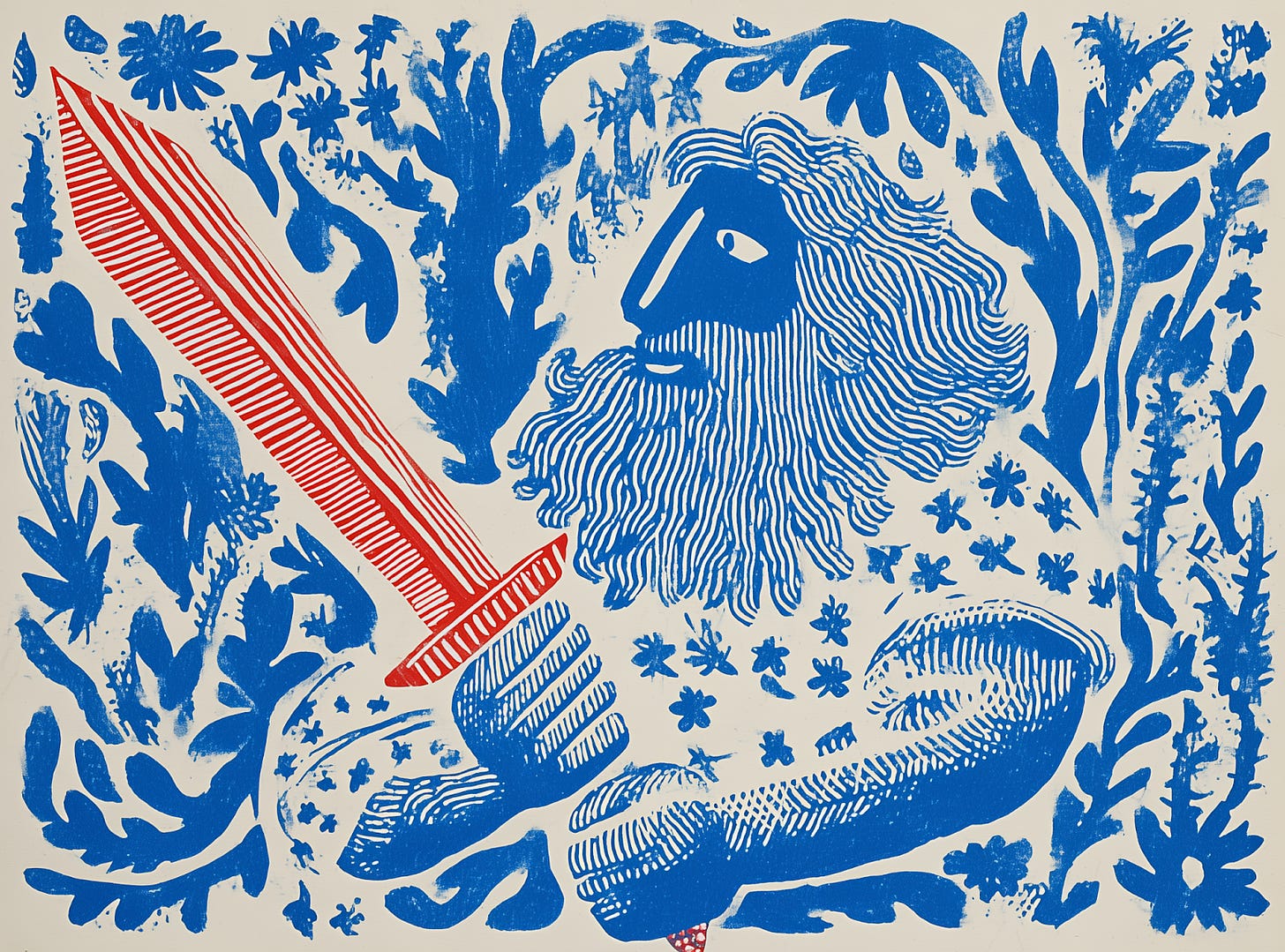The Narratives Fighting For The Soul of Humanity (ft. Jordan Hall)
As the post-WWII order (and the narrative that kept it alive) collapses, three types of competing narratives vie to shape what comes next—and only one leads to life.
Jordan Hall (deepcode) has spent decades correctly predicting the civilizational unraveling we're now experiencing. He co-founded DivX, served on elite boards like the Santa Fe Institute, co-founded the Game B movement—but when his pursuit of truth led him to Christ two years ago, he followed it, even knowing it would change his standing in the secular elite circles he'd helped shape.
We spoke for three and a half hours, days after Charlie Kirk's assassination made spiritual warfare feel viscerally real. While my previous piece laid out practical steps—love enemies, prepare your temple, build prayer as weapon—Jordan revealed something deeper:
We're in a civilizational contest over what story humanity will tell itself about reality for generations to come.
The Post-WWII Narrative Is Dead
Most of us have grown up taking American hegemony for granted—the dollar as global reserve currency, Hollywood setting cultural norms, Silicon Valley driving innovation. But beneath these institutions was a narrative that held it all together: democracy is good, fascism is evil, and America leads the free world against tyranny.
"We passed a tipping point around 2024," Jordan told me. "The post-war order and narrative—both are done. There's no coming back."
This post-WWII narrative was brilliantly simple. After defeating the Nazis unconditionally, America built a moral order where racism and everything that wasn't "democracy" became the evils to purge from within the good. These were ultimately secular definitions of good and evil—Christian-adjacent but not requiring God. This narrative held the Western world together for 80 years—through the Cold War, civil rights, and the digital revolution.
But that narrative has exhausted itself.
Institutions are collapsing, corruption is obvious, and the old stories that kept liberalism alive no longer command belief.
Most insidiously, our culture has normalized sacrificing the immeasurably sacred for measurable material gains. Jordan gave me a devastating example:
"If I offer a 31-year-old father with three kids double his salary to move from Gary, Indiana to Palo Alto, what's he going to do? He's going to leave his parents, grandparents, his wife's parents, all the kids' friends, everyone at church. That's the gladiatorial combat right there. Our culture has so radically profaned relationships that we trade things that are qualitatively irreplaceable for things that are quantitatively measurable."
This is what Jordan calls "the insidious Holocaust"—Satan converting parents into "murderers of their own children," separating them from life in countless subtle ways.
Over the next five years, this order will dissolve into ruins. "MSNBC may still exist. It may not. J.P. Morgan might not survive. Things that seem utterly impossible will simply happen."
When secular orders collapse, power vacuums grow. And power vacuums historically produce massive bloodshed—which is why the question of the next grand narrative matters so profoundly. We're about to determine what story humanity will tell itself about the nature of reality for generations to come.
The Three Types of Narratives Fighting for Humanity's Soul Today
As we discussed where civilization is heading—especially in light of recent violence and the obvious acceleration of conflict—Jordan laid out three types of grand narratives that will vie to organize human society as the post-World War II order finally collapses.
The Transhumanist Narratives deny spirit and worship technology, seeking escape from the human condition itself—whether Silicon Valley's brain-uploading dreams or China's state-directed experiments. Transhumanists believe consciousness must transcend flesh, pursuing what Jordan calls "accelerated liberalism" or “the final form of Progressivism” that collapses into nihilism—where nothing is sacred because nothing is real except the will to power.
This is the narrative of those who yearn to merge with AI, or otherwise escape the boundaries of human flesh. They see mortality as a bug to be fixed, not a feature of creation. Their fatal flaw? As Jordan explains, they're trying to survive a spiritual war with material weapons—a category error that will prove fatal. They have no ontology for the miraculous, no framework for understanding that reality is fundamentally spiritual. In their pursuit of transcending humanity, they're actually fleeing from the very thing that makes us human: our capacity to bear God's image in flesh.
Ethno-Pagan Narratives worship the spirit and history of a tribe, bloodline, or nation rather than universal truth. Whether a Chinese imperial restoration, a Russian nationalism, or some ethnic supremacist movement, they put blood above truth. While some claim to worship a universal God, in practice they worship their tribal “gods”.
Jordan describes how China is becoming the "cardinal example"—with Xi positioned as the celestial emperor who has the mandate of heaven, restoring the Middle Kingdom with Confucianism and Daoism elevated to their hierarchical roles.
Unlike transhumanists, ethno-pagans aren't strict materialists—they recognize spiritual reality and can mobilize deep human loyalties through sacred symbols and stories. But here's the fatal flaw: while they establish hierarchical order within their tribes, their "local gods" cannot recover from the Fall—humanity's separation from divine perfection. As Jordan notes, "their unity always degenerates into corruption" (like the cycles of Chinese civilizations rising and falling). Without access to universal redemption, their tribal orders inevitably collapse into the same patterns of domination and decay, unable to transcend the zero-sum conflicts that define fallen nature.
Universal Sacred Narratives maintain that truth transcends ethnic boundaries while remaining fundamentally spiritual. These are stories that say the same God is accessible to all people regardless of blood or soil, that the sacred isn't owned by any tribe but offered to all humanity.
These universal sacred narratives are what Jordan calls "mythologies"—and we need to reclaim that word. In his definition, mythologies are not primitive attempts at science or childish fantasies. They're narratives where the line between the ordinary and the supernatural dissolves, that reveal reality in its largest sense. Mythologies remember what we've forgotten: that reality is intrinsically miraculous, that it doesn’t make sense to segregate the supernatural into fairy tales and superhero movies.
But our secular age—and you can speculate why—has hidden the truth. We've put the "ordinary world" on a pedestal, making daily life infantilizing—push a button, food arrives; click a link, entertainment streams. "The ordinary world denatures you," Jordan explained. "It removes you from values, from virtue." But this controllable surface sits atop a much larger reality where the miraculous happens constantly. Because we can't mechanically reproduce things like divine healing, we pretend it doesn't exist.
As Jordan argues, while there are various universal sacred narratives, the two most worthy of serious consideration are Islam and Christianity. Both have repeatedly been at the center of multi-ethnic, transcontinental civilizations that lasted centuries—precisely because they insist on one transcendent truth that applies equally to all peoples.
Universal sacred narratives don't deny the flesh like transhumanists, nor do they worship it like ethno-pagans. They offer something beyond both: a sacred order that includes all of creation while transcending tribal boundaries.
Christianity as the Most Life-Giving Grand Narrative
Between Islam and Christianity, why choose Christianity?
Ultimately, it's an article of faith. But as Jordan concluded after years of searching:
"Christianity is the most capital T, True mythology."
Christianity alone offers something neither Islam nor any other mythology can: God Himself entering creation as the "Logos" incarnate. This isn't just another prophet or teacher bringing divine messages—this is the divine principle that holds reality together becoming human.
As Jordan explained, the Logos is "that which enables relationships where things that are distinct come into a new form of unity while maintaining their uniqueness." The Logos is also that which orders reality in a way that maximally perpetuates truth, beauty, and goodness. This is the same Logos that John's Gospel declares: "In the beginning was the Word [Logos], and the Word was with God, and the Word was God... All things were made through Him... And the Word became flesh and dwelt among us."
When God became man in Christ, the gap between Creator and creation was permanently bridged. He didn't just send commands from above—He clarified what matters most to those who believe in Him and His resurrection: who we are (image bearers of God), how we ought to live and treat one another (love God and love neighbor), how we interact with the supernatural (through prayer, worship, and using gifts of the Holy Spirit dwelling within us), and what happens after we die (joining Him in eternal life).
And Christianity isn't just about individuals ordering their lives—it's about giving humanity at every scale a narrative capable of helping us build life-giving families, communities, and nations from the ruins. Without the Logos incarnate at the center, we get the collapsing order we see today. With Him, we get the possibility of genuine flourishing—not just for hundreds or thousands, but potentially for unlimited numbers of people.
While transhumanism denies the supernatural entirely and ethno-paganism corrupts it for tribal conquest, Christianity offers the one True mythology that properly orders both ordinary and supernatural reality, at every scale of civilization and until the end of time.
Embracing the mythological nature of Christianity is part of what Jordan calls the "rectification of names" (which deserves its own article). At the end of civilizational cycles, we must restore proper meaning to words that have been deliberately corrupted. The adversary perverts language precisely because words shape reality. When we lose the true meaning of words like 'mythology', 'religion', 'faith', and 'community', we lose our ability to navigate reality properly.
As a separate note, here’s a great video explaining the significance of Christ being the Logos incarnate.
Expect Strange Alliances in the Battle for Tomorrow
The grand narratives fighting for humanity's soul aren't staying in their lanes:
Putin and Xi discuss immortality—ethno-pagan leaders flirting with transhumanist dreams. Peter Thiel courts Christians toward techno-acceleration while lecturing the elite on the Antichrist. Trump’s 'Department of War' posts videos of war machines while reciting the Lord's Prayer. Nick Fuentes' blood-and-soil revanchism explicitly merges ethno-paganism with Christianity.
As Jordan explained: "It's kind of like the Soviets and the Anglo-Americans in World War II. Team up to fight [the Nazis]? Two seconds later, now we're at war." These partnerships are fundamentally unstable—the instant a common enemy falls, former allies become adversaries.
The challenge for Christians in this moment is profound: how to maintain Christianity's universal truth while resisting seductive alliances that would corrupt it. Any earthly power—whether transhumanist tech billionaires, ethno-pagan movements, or political parties—will try to wrap itself in God's name to elevate itself.
The Proper Order: Christ Above All Earthly Powers
So is the key for Christians to advance God’s will in the world without engaging with transhumanists or ethno-pagans?
Jordan clarifies something important:
The danger isn't engaging with earthly powers—it's getting the order wrong.
Technology, nation, tribe, and politics aren't inherently evil—they're inevitable parts of creation that become corrupted when we elevate them to God's position at the top of the hierarchy. The moment they claim that position, they become idols.
"Technology is not bad; worshipping technology is bad," Jordan explained. "If you are able to include technology inside the Logos (which you can), then you take the best parts of Transhumanism, separate the dross, and integrate them into a lifework."
The same principle applies to ethnicity and nation. There's something good and real about lineage and cultures—"we don't want to mix all humans into a homogenized frappe". As Jordan notes, "All the nations come to Christ. But all the nations must be in order to come to Christ." The challenge is maintaining proper order: Christ first, then nation.
The people of a nation keeping Christ first helps each nation benefit from the largest, most timelessly life-giving framework that allows citizens to live together well, and provides the living water that helps stave off corruption and decay.
I witnessed this principle in action at Charlie Kirk's memorial service in Arizona this past Sunday. While some speakers, especially President Donald Trump, attempted to turn grief into partisan mobilization, the event, watched by apparently a hundred million people that day alone, was a demonstration of proper divine order.
As Jordan pointed out to me the day after the memorial, Christ remained the true center (of both Charlie's life and the memorial itself), and the political messages were ultimately subordinated to the Gospel. "Erika's forgiveness [of Charlie's killer] was the key message. And Trump's lack of forgiveness was exposed as not fully participating in the Highest."
This is the crucial insight: when we maintain proper order with Christ at the apex, earthly realities can serve life-giving purposes. Technology can enhance human flourishing rather than replace humanity. Individual nations can maintain their unique, distinctive cultures and traditions while participating in universal truth. Politics can become more of a peaceful contest over who better represents and serves a God-fearing population rather than who claims divine mandate for partisan ends. Business can support family formation and rootedness rather than fragmenting communities.
As I argued in my Christofuturism piece, we must respect the divine ordering of reality—in everything we do. When we create, say, AI that serves rather than supplants the sacred, we're participating in proper divine order.
The danger isn't in engaging with these earthly realities—it's in letting them claim the throne that belongs to God alone.
The Way Forward? Become the Blade, Not the Swordsman
Let's say you're bought into the idea that Christianity is the one True mythology worth embodying and proliferating—the only narrative that illuminates and properly orders both our ordinary and supernatural reality while offering genuine redemption for all.
How then should we live? How can we help win the battle over our souls and others' souls?
Jordan emphasizes obedience.
"A friend of mine says, you must become the blade, not the swordsman," Jordan explained. "God is the ultimate samurai. He does not hack away.” We were each designed to be swung to make a “single perfect cut."
You must become the blade, not the swordsman.
This is the key to surviving what's coming: total obedience to divine will. Whether you're called to build a local church community, teach children, create a political action group, become a warrior in the military sense, or something else entirely—that specific calling is the most noble version of spiritual war you can wage.
When I asked about his current calling, he didn't talk about influencing policy or building movements, which is what he spent years doing in secular elite circles. Instead, he spoke about God wanting him to help get Jonathan Pageau's children's fairy tale books into more hands. (Jonathan is a brilliant Orthodox Christian thinker and creative who illuminates how our reality is filled with divine patterns, which can be illuminated effectively through fairy tales)
Through the blade/swordsman metaphor, Jordan made something clear to me. Remember that it's better to think of us as His instruments of spiritual war, more than soldiers or even generals meant to master plan the Enemy's downfall.
"The instant you endeavor to strategize, to plan, you insert your will for His will, then you're done," Jordan warns. Becoming a missionary—something that seems obviously good—could be "infinitely wrong" if God actually wants you to be a teacher, a scientist, or anything else.
(The question of how to discern God’s will is out of the scope of this piece, but explore resources and give this practice the time and reverence it deserves. And make sure that what you may sense as a calling from Him aligns with Scripture.)
Our discussion on following God’s will echoes what Charlie Kirk himself taught repeatedly: the Hebrew word "Hineni" (הִנְנִי)—"Here I am." Abraham said it at the binding of Isaac. Moses at the burning bush. Samuel and Isaiah when called. It means: "Lord, use me. Give me my marching orders." Not "Here's my plan for You," but "Here I am for Your plan."
So obey. Let Him use you however He wants to use you. The results of how He swings you will shape what will emerge from the ruins.
If this piece resonated with you, please share it with someone who needs to hear it. And if you haven't read my previous piece on How to Fight the Spiritual War Ahead, I encourage you to start there for the practical steps we all need to take.
You can watch/listen to my full conversation with Jordan Hall here on YouTube.







Bro a Gary Sheng x Jordan Hall crossover post about Christianity and the meta-crisis is low key peak hope punk
Very profound ideas.
So easy to not be humble and think of yourself as a general, choosing actions that seem most impactful to you, but might be highly counterproductive in the larger scheme of things. We humans tend to be like that and it’s good to notice it.
Also “become the blade” is a very epic call to action